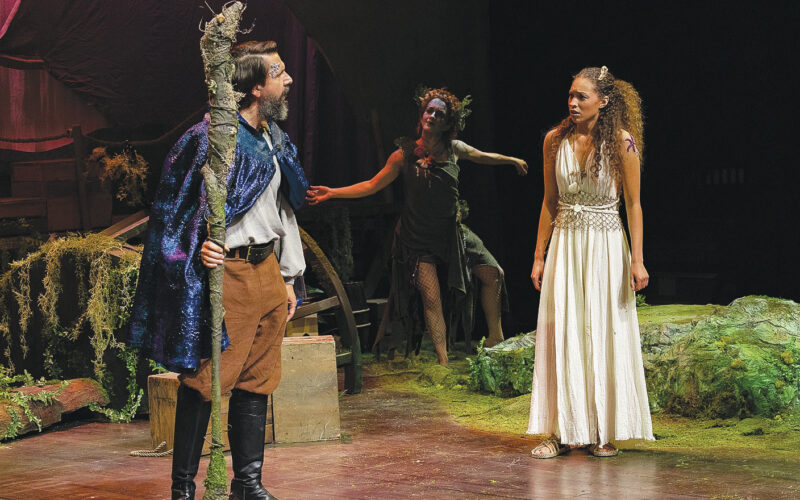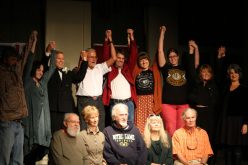On stage June 30-July 1 in Fayetteville, Shakespeare’s ‘Tempest’ all about foregiveness, redemption, love

BECCA MARTIN-BROWN
bmartin@nwaonline.com
“O, wonder!
“How many goodly creatures are there here!
“How beauteous mankind is! O brave new world,
“That has such people in’t!”
― William Shakespeare, “The Tempest”
“‘The Tempest’ is believed to be Shakespeare’s final play (or at least his last solo project) before his death in 1616,” director Morgan Hicks begins. “When the First Folio was published in 1623, ‘The Tempest’ holds the esteemed position of first in the volume. The play feels important. It meant something special to Shakespeare and the people who knew him. And it means something special to us. In a word, it is magical.”
But…
“We are dealing with iambic pentameter and verse and a LOT of words that we had to look up to make sure they meant what we thought they meant,” she admits. “We spent our first full week doing ‘table work,’ which is the part of the rehearsal process where you literally sit around a table and discuss every single line in the play. It’s like the most intense and specific master class seminar that you can imagine.
“No one — not even the most experienced actors or Shakespeare scholars — can understand everything from reading Shakespeare,” Hicks adds. “But I think if you see a production that deeply understands the story it is trying to tell, you will have no trouble following it. I personally think this is one of those productions.”
After previous performances at the University of Central Arkansas in Conway, “The Tempest” comes to Fayetteville June 30-July 1 in a partnership between Arkansas Shakespeare Theatre and the University of Arkansas. Hicks directed the play, and the cast includes Northwest Arkansas actors Steven Marzolf as Prospero, Betsy Jilka as Iris and Grace Taylor as Ariel.
The story is set amidst the “leftover elements of the shipwreck that brought Prospero to this abandoned island 12 years before the play begins,” and “the costumes evoke the 1600s when the play was first performed,” Hicks says. “I really do love high-concept Shakespeare productions … and feel like that is such a fun way to create accessibility with our contemporary audiences. But when I was brought on to direct this production, and I began to deeply dive into this story, I realized pretty quickly that there wasn’t a concept that I could come up with that would bring me, or I think our audiences, closer to the story.
“I am really pleased with how accessible and easy to understand the play is even without altering the time period or the language.”
Hicks admits the script was tightened so it would run under two hours, “but I would say we used a scalpel rather than a hatchet!” She had help from Marzolf, who has spent much of his professional life working on Shakespeare — which he finds ironic.
“In all honesty, I hated Shakespeare growing up,” he says. “In high school and college, the bard’s language felt unreachable, and it intimidated me. I never had anyone who could help me understand it.
“It wasn’t until I started working professionally as an actor in 2003/2004 with the Milwaukee Rep and Chicago Shakespeare Theater that I really fell in love with it,” he explains. “I was working with these incredible actors, and they knew what they were saying and doing, so I understood it. I realized how beautiful the language was and how it could affect an audience…”
So, “coming from the guy who didn’t get it and hated it when I was younger, I understand people being timid about Shakespeare and watching his plays,” Marzolf adds. “But really, his plays are incredibly relatable and reflect to us our own humanity. An audience isn’t going to understand every single word, and that’s OK. But you will understand 90% of it.”
And you’ll never be bored, adds Grace Taylor, who plays the air spirit Ariel.
“I started my career in musical theater, which is a genre that requires its performers to juggle a lot of balls at once: singing, dancing, and acting all at the same time,” she says. “While performing in musicals, my brain is very busy keeping on top of choreography, harmonies, and connecting with onstage partners.
“Performing Shakespeare scratches the same itch for me. The heightened language, powerful imagery, alliterations, appositions, and double meanings are all as delicately crafted as the composition of a musical score. No matter the size of a role, Shakespeare’s characters demand a mastery of breath control and full embodiment of character.
“Shakespeare’s characters don’t talk like we do, so it’s easy to feel intimidated,” she admits. “But his stories are as entertaining as they were during his time.”
In “The Tempest,” “Prospero is a powerful magician and sorcerer,” Marzolf tells the story. “He was the rightful Duke of Milan who was usurped by his brother and put on a boat with his 3-year-old daughter to basically die. Instead, they ended up on this island, where they have been living for the past 12 years. At the beginning of the play, Prospero’s enemies are sailing back from Tunis, so he creates this ‘tempestuous storm’ that shipwrecks them onto the island, so he can enact his revenge. But through the course of the play, Prospero learns forgiveness and what it means to regain one’s humanity.”
“The themes of forgiveness, redemption, and a return to love seemed like the perfect fit for the time we are living in,” says Chad Bradford, managing director of Arkansas Shakespeare Theatre. “Stories are the way we learn to comprehend the world. And as lofty as that might sound, it’s my deepest wish that our productions increase our ability to understand ourselves and others with more compassion and joy.”
“I want audiences to walk away thinking about the importance of taking responsibility for your own actions and the power of forgiveness,” says Taylor. “‘The Tempest’ itself is a metaphor for the storm of emotions that can fester inside all of us without leading with empathy and, in Caliban’s words, seeking for grace.”
FAQ
‘The Tempest’
WHEN — 7:30 p.m. June 30 & 2 p.m. July 1
WHERE — Global Campus Theatre on the Fayetteville square
COST — $10-$20
INFO — arkshakes.com
BONUS — AST will also present “The Complete Works of William Shakespeare (Abridged)” at 2 p.m. June 30 and 7:30 p.m. July 1 at the Global Campus Theatre. Tickets are $10-$20.









